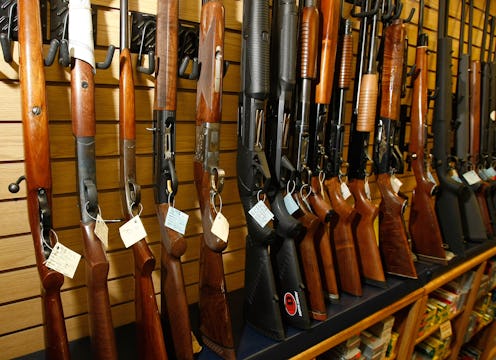News
Shooting A Gun Didn't Change My Mind About Them
I've never understood guns — why people love them so much, why they think it's fun to shoot them, why they collect them. I was always simply terrified of guns — which was extra difficult, given that I grew up in the South, nearly surrounded by them. My mother claimed to have one tucked away somewhere in the house when I was growing up, but I never believed her, because I never saw it. My cousins used to shoot BB guns in the backyard on holidays while I would stand on the porch and watch. I went to parties in middle school and high school where we hung out in some basement next to someone’s ridiculous gun collection. As soon as anyone started to get the guns out to show them off, I hightailed it out of there. I hated being in the same room as a gun, and I didn’t want to know or understand how they worked. I didn't think you needed to know how a gun worked, or what it felt like to use one, in order to know that they were dangerous.
My childhood fear of and exposure to guns also correlated with a disturbing American trend. The Columbine shooting happened on April 20, 1999, when I was eight years old and could only muster the vaguest concept of how very bad and random it was. Incidents of mass shootings in the U.S. began to rise from the time I was in middle school, which seemed to confirm my wariness of firearms. In 2009, while I was working less than a mile away at a restaurant in downtown Athens, Georgia, a professor shot and killed three people in broad daylight at a local theater I had attended and worked at many times throughout my childhood. My classmates and family friends were witnesses to and victims of senseless violence.
After that, it seemed to snowball. Fort Hood, Tucson, Aurora, Newtown, Santa Barbara. I was at a loss. My fear of guns wasn’t irrational now, based only on movies and The O.C. It was real; people were buying guns legally and using them to kill strangers. I wondered how anyone could possibly defend guns throughout all of this. Sure, I had never touched a gun, but I knew I didn't need to. I could tell that they held no attraction or power for me, and was baffled by those for whom they did.
Which doesn't mean I didn't have any friends who loved guns. One gun-loving friend — who, lest you jump to stereotypes, is a liberal, worldly lesbian woman studying intellectual property law — accompanied me on a weekend trip to Tennessee. We spent the day mudding (an activity in which, yes, you drive your car through mud) and drinking cheap beer. Eventually, she and her sister wanted to go shooting. I had been quietly having a panic attack about the presence of guns all weekend, but this was it. Something changed in me. I wanted to know. I had spent so long trying to block out the very existence of guns, but now I wanted to see what the fuss was about. Is there some thrilling full-body sensation when you pull the trigger? Is hitting your target as satisfying as it is in darts? Do you secretly need some great inner strength to hold your own against the recoil? I wondered, on some level, if this would explain the passion so many people around me had for guns.
They assured me that everything was safe, we made sure the area was clear, and I shot a gun at a target for the first time in my life. I didn't feel a rush or a sudden sense of power. I felt nothing. I shot again. Nothing. I shot another gun, and I still felt nothing. There was no thrill here. This is what people were defending? I felt a disconnect. Sure, I’ve wielded weapons before. I taught archery for many years, I’ve chopped wood, and I’ve fenced. My entire family is military. I love so many aspects of Southern culture, and I am proud that our rights to personal property are protected in the United States.
But that moment confirmed that for me, the risks and the repercussions of owning guns greatly outweigh the fun, culture, and tradition associated with them. In 2015 alone, there were 372 mass shootings in the U.S., resulting in the deaths of 475 people. More often than not, these guns were bought legally, and the shootings were committed by people with no record. We can’t control when people snap. We can’t control for things like toxic masculinity, white supremacy, extremist religious beliefs, or terrorist activity. What we can control are the guns — when, where, how, and to whom they are sold. As I put down that gun that day, I knew that more than ever, I believed that to be true.
Last week, Barack Obama issued executive orders to improve gun control, through actions like taking control of gun show sales and increasing background checks. I believe that none of this is a threat to anyone's culture or rights. I believe that you can hold on to your culture, your history, your Second Amendment, and that there can still be less gun violence.
